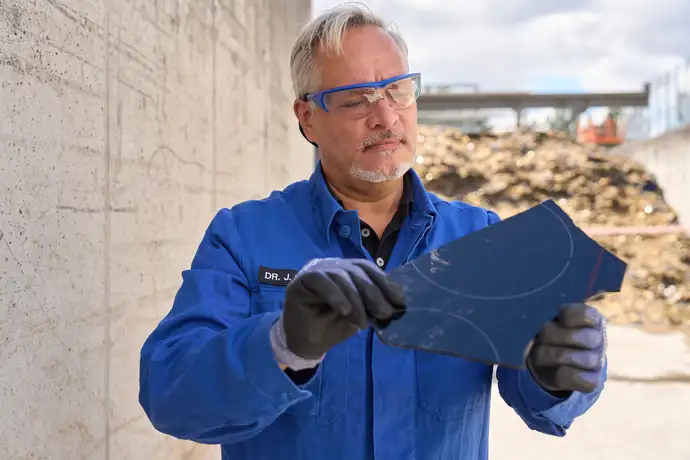Next Milestone: Successful SCHOTT pilot project for circular economy
Tuesday 4 November 2025, Germany, Mainz
- Technology group works with partners from the waste disposal and household appliance industries to return end-of-life glass-ceramic cooktops to the production cycle for the first time
- Multi-week large-scale trial confirms technical feasibility with glass-ceramic cullets.
- The legal framework for a functioning circular economy must be further developed, and recycling potential expanded.

Technological and political challenges
Glass-ceramics and specialty glasses are technically demanding: they must be melted at very high temperatures and meet far stricter quality requirements than bottle or window glass. This is why the successful remelting of old glass-ceramic shards marks an important technological breakthrough for establishing a functioning circular economy in the cooktop sector.The current challenge is that, while there is a nationwide return option for large electrical appliances, there is no separate and non-destructive collection system for cooktops. SCHOTT and its partners are working with retailers to establish appropriate systems in order to collect more cullet. Yet, to implement cooktop recycling on a large scale, a supportive regulatory framework is needed. So far, Germany and the EU lack regulations for the separate collection of specialty glasses, which is why cooktops are currently shredded together with other large kitchen appliances, like washing machines, at waste sorting facilities — making proper recycling for the glass production impossible. Together with its industry partners, SCHOTT is calling on policymakers at both the national and European levels to back the circular economy for cooktops through clear, supportive regulations.
"The pilot projects show that we as an industry can make a meaningful contribution. Now it is important, together with policymakers and society, to ensure that old appliances do not end up in general waste, but are collected purposefully and without destruction,” says Dr. Torsten Derr, CEO of SCHOTT AG.
Background: CERAN® – Innovation with responsibility
SCHOTT with CERAN® is market leader for durable glass-ceramic cooktops since its market launch in 1971. The material is made predominantly from natural raw materials like quartz sand and stands out for its high thermal resistance, durability, and resistance to chemicals and temperature fluctuations. SCHOTT CERAN® is manufactured exclusively in Germany. The facility in Mainz represents the highest quality standards, technological precision, and responsible production.For decades, the technology group has been using glass cullets from its own production as a valuable raw material for internal recycling loops: Even now, almost all internally generated shards are recycled back into the production process. This allows the company to avoid waste, save energy, and reduce emissions — a proven model that is now being applied to end-of-life appliances for the first time. With the new pilot project, the company demonstrates that externally collected glass-ceramics — including material from other manufacturers — can also be a valuable raw material for the future.
Sustainability as a company goal
Through projects focused on recycling glass-ceramic cooktops and pharmaceutical packaging, SCHOTT is driving the transformation toward a functioning circular economy. The goal: preserve raw materials, avoid waste, and reduce dependency on imports — in line with the objectives of the EU Green Deal.In addition, the company is working intensively to decarbonize its energy-intensive production processes and supply chains. This includes increasing the use of renewable energy, investing in energy-efficient melting technologies, and collaborating with suppliers to reduce emissions across the entire value chain.
Learn more about sustainability at SCHOTT
CERAN® is a registered trademark of SCHOTT AG.
According to SCHOTT’s calculations, around 1.3 million old glass-ceramic cooktops are discarded in Germany every year, which corresponds to approx. 4,000 tons of glass-ceramic. Photo: SCHOTT/ O. Ruether
For decades, SCHOTT has been using glass cullet from its own production as a valuable raw material in its internal recycling cycles. Photo: SCHOTT/ O. Ruether
Through recycling projects for glass-ceramic cooktops and pharmaceutical packaging, SCHOTT is driving the transformation towards a functioning circular economy. Photo: SCHOTT/ H. Naegele
The SCHOTT pilot projects demonstrate that industry can make an important contribution. The prerequisite: old appliances must not end up in residual waste but should be collected selectively and without damage. Photo: SCHOTT/ O. Ruether
About SCHOTT
International technology group SCHOTT produces high-quality components and advanced materials, including specialty glass, glass-ceramics, and polymers. Many SCHOTT products have high-tech applications that push technological boundaries, such as flexible glass in foldable smartphones, glass-ceramic mirror substrates in the world's largest telescopes, and laser glass in nuclear fusion. With their pioneering spirit, SCHOTT’s 17,400 employees in over 30 countries work as partners to industries such as healthcare, home appliances, consumer electronics, semiconductors, optics, astronomy, energy, and aerospace. In fiscal year 2024, SCHOTT generated 2.8 billion euros in sales. In addition to innovation, one of its important corporate goals is sustainability. SCHOTT was founded in 1884 and is headquartered in Mainz, Germany. The company belongs to the Carl Zeiss Foundation, which uses its dividends to promote science. Further information at SCHOTT.com

Christine Fuhr
Communications Manager



